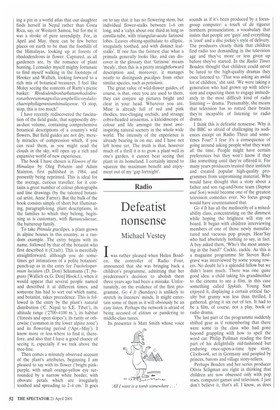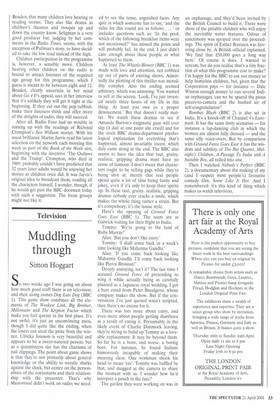Defeatist nonsense
Michael Vestey
Iwas rather pleased when Helen Boaden, the controller of Radio Four, announced that she was bringing back a children's programme, admitting that her predecessor's decision to abolish them three years ago had been a mistake. Unfortunately, on the evidence of the first programme, Go 4 It (Sundays) is unlikely to stretch its listeners' minds. It might entertain some of them as it will obviously be an easy listen. Perhaps the network is afraid of being accused of elitism or pandering to middle-class tastes.
Its presenter is Matt Smith whose voice
sounds as if it's been produced by a focusgroup computer: a touch of de rigueur northern pronunciation, a vocabulary that insists that people are 'guys' and everything is 'cool' and a disc jockey's style of delivery. The producers clearly think that children find radio too demanding in the television age and they've more or less given up before they've started. In the Radio Times Boaden thought that children could never be lured to the high-quality dramas they once listened to. 'That was asking an awful lot of children,' she said. 'We were taking a generation who had grown up with television and expecting them to engage immediately in the most difficult kind of radio listening — drama.' Presumably, she means that television has so rotted their brains they're incapable of listening to radio drama.
I think this is defeatist nonsense. Why is the BBC so afraid of challenging its audiences except on Radio Three and sometimes Four? I fear it's a consequence of going around asking people what they want all the time. People might have certain preferences but they won't know if they like something until they're offered it. For many years producers trusted their instincts and created popular high-quality programmes from unpromising material. Who would have thought that a story about a father and son rag-and-bone team (Steptoe and Son) would become one of the greatest television comedies ever. No focus group would have countenanced that.
Go 4 It has all the mediocrity of a mixedability class, concentrating on the dimmest while hoping the brightest will stay on board. It began with children interviewing members of one of those newly manufactured and vacuous pop groups, Hear'Say who had absolutely nothing to say, in fact. A boy asked them, 'Who's the most annoying in the band?' Cackle, cackle. As this is a magazine programme Sir Steven Redgrave was interviewed by some young rowers. No doubt he's a splendid fellow but we didn't learn much. There was one quite good idea: a child taking his grandmother to the cinema to see a film, in this case something called Spykids. Young Sam enjoyed it, displaying a certain critical faculty but granny was less than thrilled, I gathered, giving it six out of ten. It had to be a film, of course, not a play, book or radio drama.
The last part of the programme suddenly shifted gear as if remembering that there were some in the class who had gone beyond grappling with how to spell the word cat: Philip Pullman reading the first part of his delightfully old-fashioned but enduring once-upon-a-time type story, Clockwork, set in Germany and peopled by princes, barons and village story-tellers.
Perhaps Boaden and her series producer Olivia Seligman are right in thinking that children are now obsessed only with pop stars, computer games and television. I just don't believe it, that's all. I know, as does Boaden, that many children love hearing or reading stories. They also like drama as children's theatres and troupes up and down the country know. Seligman is a very good producer but, judging by her comments in the Radio Times, seems, with the exception of Pullman's story, to have decided to take the low road instead of the high.
Children participation in the programme is, however, a sensible move. Children hearing other children on the radio is bound to attract listeners of the required age group for this programme, which I guess is meant to be between eight and 12. Boaden, clearly uncertain in her mind about Go 4 It's appeal, says in her interview that it's unlikely they will get it right at the beginning. If they cut out the pop rubbish, make their listeners think and offer more of the delights of radio, they will succeed.
After all, Radio Four had no trouble in coming up with the readings of Richmal Crompton's Just William stories. With his usual brilliance Martin Jarvis read his latest selection on the network each morning this week as part of the Book of the Week slot, beginning with the inventive 'The Outlaws and the Tramp'. Crompton, who died in 1969, probably couldn't have predicted that 32 years later adults would be enjoying her stories as children once did. It was Jarvis's original idea to broadcast them, reading all the characters himself. I wonder, though, if he would get past the BBC doormen today with such a suggestion. The focus groups might not like it,



































































 Previous page
Previous page